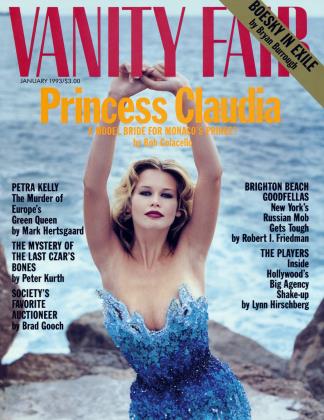Sign In to Your Account
Subscribers have complete access to the archive.
Sign In Not a Subscriber?Join NowRock of Ages
There's a wonderful photograph of George Martin from the Sgt. Pepper sessions. He's in jacket and tie, delicately holding a cigarette, like a gentleman at a yacht-club dance. The Beatles surround him in full psychedelic garb, and the contrast is poignant. The man who made it all happen, Martin was still an outsider at the party.
Beatle fans tend to assume that when the party ended in 1970 Martin did, too. Not so. For two decades, his AIR Studios, built above London's Oxford Circus, drew Eric Clapton, Elton John, and Paul McCartney, among others. Now, blithely bucking the home-studio trend, he's built a larger version in Lyndhurst Hall, a 19th-century Methodist mission, to be rechristened December 13 with a command performance called "An Evening with Dylan Thomas," featuring actors Anthony Hopkins and Jonathan Pryce.
If Martin's place in pop history seems cast in amber, it is, at least, a formidable place. When he signed them to EMI's Parlophone division in 1962, the Beatles had already been turned down by every label in town. More important, Martin found the sounds to match their musical ideas. For "Tomorrow Never Knows, ' on the Revolver album, John Lennon could say only that he wanted to hear 4,000 monks chanting. "I want to sound as though I'm the Dalai Lama singing from the highest mountaintop, ' ' Lennon said. "And yet I still want to hear the words I'm singing." Martin responded by running Lennon's vocals through a revolving Leslie speaker inside a Hammond organ, creating a magnificent swirling effect. To capture the carnival feel of "Being for the Benefit of Mr. Kite!," Lennon declared, "I want to smell the sawdust." Martin's solution: 19 different segments of Sousa marches on steam organs run backward and forward, then jumbled together.
Still happily married to his wife, Judy, after 26 years and two children, Martin rues only the loss of his Caribbean studio on Montserrat, devastated by Hurricane Hugo in 1989, and that of thousands of homes of fellow islanders, to whom he's since donated profits from hits recorded there. Certainly he has no regrets about the end of his Fifth Beatle days. "I hate doing things forever," he says from Lyndhurst Hall. "In fact, I don't want to be remembered at all." -PETER DONALD
PETER DONALD
 View Full Issue
View Full Issue






Subscribers have complete access to the archive.
Sign In Not a Subscriber?Join Now